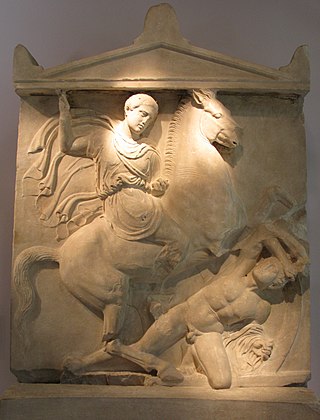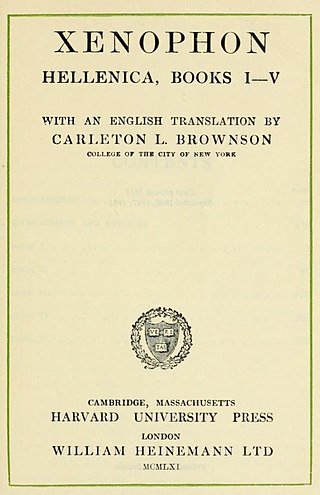Agesilaus II was king of Sparta from c. 400 to c. 360 BC. Generally considered the most important king in the history of Sparta, Agesilaus was the main actor during the period of Spartan hegemony that followed the Peloponnesian War. Although brave in combat, Agesilaus lacked the diplomatic skills to preserve Sparta's position, especially against the rising power of Thebes, which reduced Sparta to a secondary power after its victory at Leuctra in 371 BC.
This article concerns the period 379 BC – 370 BC.
This article concerns the period 389 BC – 380 BC.
This article concerns the period 369 BC – 360 BC
Year 395 BC was a year of the pre-Julian Roman calendar. At the time, it was known as the Year of the Tribunate of Cossus, Medullinus, Scipio, Fidenas, Ambustus and Lactucinus. The denomination 395 BC for this year has been used since the early medieval period, when the Anno Domini calendar era became the prevalent method in Europe for naming years.
Year 418 BC was a year of the pre-Julian Roman calendar. At the time, it was known as the Year of the Tribunate of Fidenas, Axilla and Mugillanus. The denomination 418 BC for this year has been used since the early medieval period, when the Anno Domini calendar era became the prevalent method in Europe for naming years.

Year 371 BC was a year of the pre-Julian Roman calendar. At the time, it was known as the Fifth year without Tribunate or Consulship. The denomination 371 BC for this year has been used since the early medieval period, when the Anno Domini calendar era became the prevalent method in Europe for naming years.
Year 369 BC was a year of the pre-Julian Roman calendar. At the time, it was known as the Year of the Tribunate of Fidenas, Cicurinus, Cossus, Cornelius, Cincinnatus and Ambustus. The denomination 369 BC for this year has been used since the early medieval period, when the Anno Domini calendar era became the prevalent method in Europe for naming years.

Epaminondas was a Greek general and statesman of the 4th century BC who transformed the Ancient Greek city-state of Thebes, leading it out of Spartan subjugation into a pre-eminent position in Greek politics called the Theban Hegemony. In the process, he broke Spartan military power with his victory at Leuctra and liberated the Messenian helots, a group of Peloponnesian Greeks who had been enslaved under Spartan rule for some 230 years following their defeat in the Third Messenian War ending in 600 BC. Epaminondas reshaped the political map of Greece, fragmented old alliances, created new ones, and supervised the construction of entire cities. He was also militarily influential and invented and implemented several important battlefield tactics.

The Battle of Leuctra was fought on 6 July 371 BC between the Boeotians led by the Thebans, and the Spartans along with their allies amidst the post–Corinthian War conflict. The battle took place in the vicinity of Leuctra, a village in Boeotia in the territory of Thespiae. The Theban victory shattered Sparta's immense influence over the Greek peninsula, which Sparta had gained with its victory in the Peloponnesian War a generation earlier.

The Corinthian War was a conflict in ancient Greece which pitted Sparta against a coalition of city-states comprising Thebes, Athens, Corinth and Argos, backed by the Achaemenid Empire. The war was caused by dissatisfaction with Spartan imperialism in the aftermath of the Peloponnesian War, both from Athens, the defeated side in that conflict, and from Sparta's former allies, Corinth and Thebes, who had not been properly rewarded. Taking advantage of the fact that the Spartan king Agesilaus II was away campaigning in Asia against the Achaemenid Empire, Thebes, Athens, Corinth and Argos forged an alliance in 395 BC with the goal of ending Spartan hegemony over Greece; the allies' war council was located in Corinth, which gave its name to the war. By the end of the conflict, the allies had failed to end Spartan hegemony over Greece, although Sparta was durably weakened by the war.

The Battle of Mantinea was fought on 4 July 362 BC between the Thebans, led by Epaminondas and supported by the Arcadians, Argives, Messenians, Thessalians, and the Boeotian league against the Spartans, led by King Agesilaus II and supported by the Eleans, Athenians, Euboeans, and Mantineans. The battle was to determine which of the two alliances would dominate Greece. However, the death of Epaminondas and his intended successors would cost Thebes the military leadership and initiative to maintain Theban supremacy in the region. Similarly, the Spartans were weakened by yet another defeat and loss of troops. Epaminondas' death coupled with the impact on the Spartans of yet another defeat weakened both alliances, and paved the way for Macedonian conquest led by Philip II of Macedon.

Archidamus III was the son of Agesilaus II and king of Sparta from 360 to 338 BC.

Hellenica simply means writings on Greek (Hellenic) subjects. Several histories of 4th-century Greece, written in the mould of Thucydides or straying from it, have borne the conventional Latin title Hellenica. The surviving Hellenica is an important work of the Ancient Greek writer Xenophon and one of the principal sources for the last seven years of the Peloponnesian War not covered by Thucydides, as well as the war's aftermath.

The Theban hegemony lasted from the Theban victory over the Spartans at Leuctra in 371 BC to their defeat of a coalition of Peloponnesian armies at Mantinea in 362 BC, though Thebes sought to maintain its position until finally eclipsed by the rising power of Macedon in 346 BC.
The Arcadian League was a league of city-states in ancient Greece. It combined the various cities of Arcadia, in the Peloponnese, into a single state. The league was founded in 370 BC, taking advantage of the decreased power of Sparta, which had previously dominated and controlled Arcadia. Mantinea, a city that had suffered under Spartan dominance, was particularly prominent in pushing for its founding. The league was responsible for the foundation of Megalopolis.

Classical Greece was a period of around 200 years in Ancient Greece, marked by much of the eastern Aegean and northern regions of Greek culture gaining increased autonomy from the Persian Empire; the peak flourishing of democratic Athens; the First and Second Peloponnesian Wars; the Spartan and then Theban hegemonies; and the expansion of Macedonia under Philip II. Much of the early defining mathematics, science, artistic thought, theatre, literature, philosophy, and politics of Western civilization derives from this period of Greek history, which had a powerful influence on the later Roman Empire. Part of the broader era of classical antiquity, the classical Greek era ended after Philip II's unification of most of the Greek world against the common enemy of the Persian Empire, which was conquered within 13 years during the wars of Alexander the Great, Philip's son.
The Boeotian War broke out in 378 BC as the result of a revolt in Thebes against Sparta. The war saw Thebes become dominant in the Greek World at the expense of Sparta. However, by the end of the war Thebes’ greatest leaders, Pelopidas and Epaminondas, were both dead and Thebes power already waning, allowing for the Rise of Macedon.

The Theban–Spartan War of 378–362 BC was a series of military conflicts fought between Sparta and Thebes for hegemony over Greece. Sparta had emerged victorious from the Peloponnesian War against Athens, and occupied an hegemonic position over Greece. However, the Spartans' violent interventionism upset their former allies, especially Thebes and Corinth. The resulting Corinthian War ended with a difficult Spartan victory, but the Boeotian League headed by Thebes was also disbanded.
Philiscus or Philiskos was a 4th-century BC Greek tyrant of the city of Abydos, on the Asian side of the Hellespont, and a hyparch ("vice-regent") and military commander of the Achaemenid satrap Ariobarzanes. He was sent by Ariobarzanes in 368 BCE as an Achaemenid emissary to Delphi, where the Greek cities at war between themselves had assembled for peace negotiations. Philiscus had probably been sent at the request of either Athens or Sparta, to help solve the conflicts between the Greek city-states.









